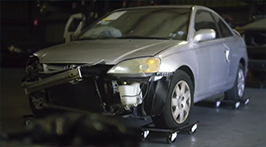An artificial heart valve is a medical device used to replace one or more of the four human heart valves in order to treat advanced cases of heart valvular disease. Open heart surgery is needed to place the artificial heart valves. These prosthetic devices can be either manufactured as mechanical medical devices or harvested from animals that are genetically similar to humans, such as pigs.
Types of Mechanical Heart Valves
In the case of mechanical heart valves, there are three main types of heart valves that are each designed somewhat differently: caged-ball valves, tilting-disc valves, and bileaflet valves. Caged-ball valves are the oldest types of mechanical heart valves in use and function through the use of a caged silicone elatomer ball that is pushed toward the far end of the cage by sufficient blood pressure and rolls back to seal the valve with each contraction of the heart. Tilting-disc valves consist of a metal ring that holds a pyrolytic carbon valve that opens and closes by tilting within the ring according to blood pressure. Many physicians recommend the use of bileaflet valves, which allow for a much more natural heart beat through the opening and closing of two semicircular leaflets that pivot on hinge-like struts with each heart constriction. Well-known manufacturers of mechanical heart valves include Medtronic, ATS Medical, CarboMedics, Pfizer, and Integra Life Sciences.
Defects in Heart Valves
While mechanical heart valves have saved the lives of hundreds of thousands of patients, there have been some instances in which defective mechanical heart valves were sold and placed in patients. One of the more common defects that has been discovered on mechanical heart valves is a faulty strut that eventually breaks down with use, causing the leaflets of the heart valve to fail to open and close correctly. The Food and Drug Administration (FDA) has also issued safety alerts and recalls for mechanical heart valves that could pose a risk of becoming dislodged from the heart due to design flaws.
Unfortunately, a faulty mechanical heart valve can cause serious injury or even kill a patient in a very short period of time when the medical device stops working properly. For example, when a dysfunctional strut in a bileaflet heart valve interrupts heart constriction, the patient may enter into cardiac arrest, and the defective heart valve may make resuscitation much more difficult. If the valve itself detaches from its holder, a patient’s odds for survival are very slim unless they can receive immediate medical attention.
Cases of Defective Heart Valves
The most serious case of defective mechanical heart valves reaching the market and actually being surgically implanted in patients involved a particular heart valve that was produced by California-based prostheses manufacturer Shiley, Inc. which is owned by Pfizer Pharmaceuticals. During the 1980s, at least 360 people lost their lives due to a faulty strut in a bileaflet mechanical heart valve that was implanted in more than 80,000 people worldwide. When it became apparent that Pfizer may have hidden some of the dangers posed by their products from the medical community, the political fallout resulted in the passage of new legislation that made business managers in healthcare companies and other industries both criminally liable for injuries and deaths that were a direct result of the concealed danger of a product.
As a direct result of the deaths caused by the defects in Pfizer’s Convexo-Concave heart valves, business managers who worked to conceal health risks posed by defective medical devices can now be criminally prosecuted and held accountable for their actions. This was a major stepping stone toward ensuring proper compliance with the FDA’s requirements that all reports of potential health risks posed by defective heart valves and all other medical prostheses be made public. Currently, artificial heart valve manufacturers are working much more closely with the federal government to ensure that defective heart valves are removed from the public as quickly as possible.
Recent Heart Valve Recalls
In more recent years, the FDA and prostheses manufacturers have issued recalls for defective heart valves under a variety of circumstances. For example, in August 2008, Minnesota based manufacturer Medtronic Corporation issued a recall of 685 of their Hall Easy Fit heart valves following the discovery of a fault in the ring that kept the valve in place, causing it to become dislodged from the heart during use. The company discovered the defect before receiving any complaints from the public and was able to issue an effective recall before any patients were injured or killed by the defective device.
Sources:
- http://www.americanheart.org/presenter.jhtml?identifier=4598
- http://www.heart-valve-surgery.com/mitral-valve-prolapse-symptoms.php
- http://www.thaindian.com/newsportal/world-news/defective-heart-valve-in-…
- http://www.thefreelibrary.com/Defective+Heart+Valve+Manufacturer+Behind+…
- http://www.accessdata.fda.gov/scripts/cdrh/cfdocs/cfRes/resCollection_2….
